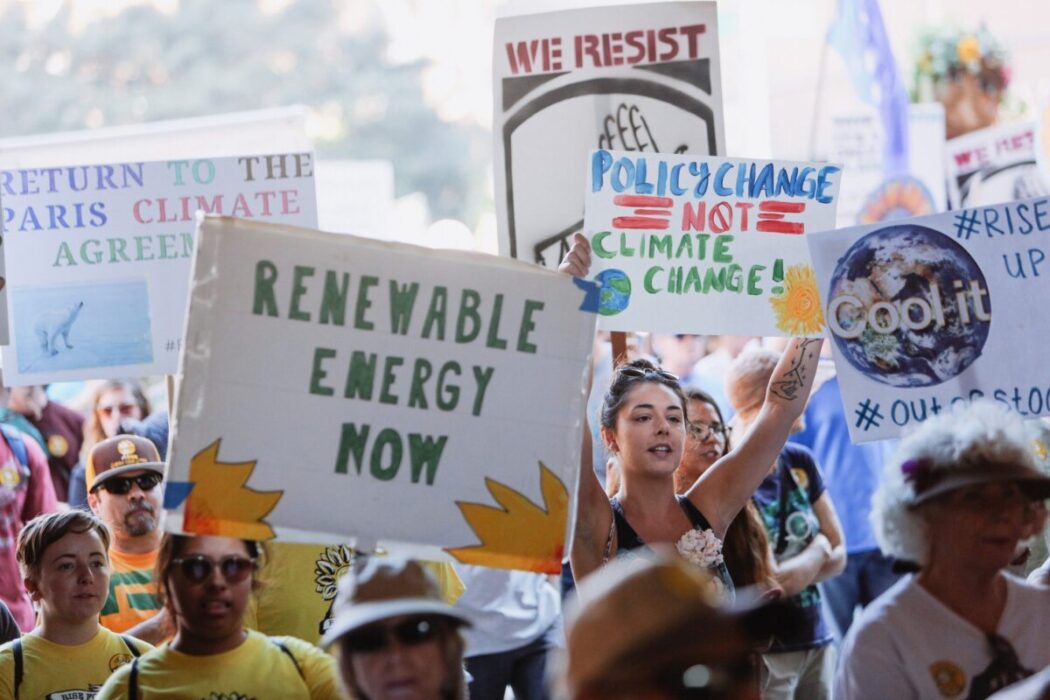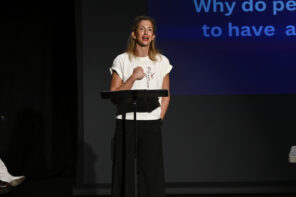Recognizing 7 women that are fighting climate change to right environmental wrongs
Climate change may be a cornerstone of recent news headlines, but it’s one thing we can really do something about, and yet far too many aren’t doing enough. Often times that something is radical activism, led by many young women—and veteran environmentalists—refusing to watch humans destroy the only livable planet we inhabit. And we now know that climate change disproportionately affects women so it’s befitting that we are the ones leading the charge, battling world leaders and those in power in an effort to course-correct before the damage done to our planet—and our lives—is irreversible.
As we enter a new season, let us be mindful of those with boots on the ground fighting every day for environmental justice, putting their freedoms on the line to bring awareness and demand action for climate change. As the COP26 met to discuss #ClimateFinance, and the G7 finally put the climate crisis on the agenda, the time for action is now. With the rising temperatures, we want to solute the female climate change activists enacting change, and share a list of who they are and what they’re fighting for.
Disha Ravi | Agricultural Activism
As recent as February 15 of this year, 21 year-old climate activist, Disha Ravi was arrested and facing sedition charges. Accused of sharing a Google Doc said to contain propaganda, she had been arrested and placed in a New Delhi prison for allegations that she distributed a “tool kit” that consisted of contact information and talking points for influential groups supporting farmers protesting against the Indian government and only recently was granted bail. Considered illegal contraband, this document was one she shared with the young and influential environmental activist, Greta Thunberg. The Indian police insist that was using that document to “spread disaffection against the Indian State.”
“In all the years that someone had asked me where I see myself in 5 years, I would have never answered ‘jail’ but here I was,” she wrote, in a statement posted on Twitter.
“Locked in my cell I wondered when it became a crime to think the most basic elements of sustenance on this planet were as much mine as theirs.” She is among the many environmental activists holding their government accountable for the destruction of the planet and the refusal to address climate change with direct action.

Autumn Peltier | Clean Water Activism
Wikwemikong First Nation‘s Autumn Peltier from the Canadian island of Manitoulin has made massive strides in educating Canadians on the lack of clean water in Indigenous communities in Canada. Bringing the topic to the forefront of conversation, this 16 year-old young woman made a three-time International Children’s Peace Prize-nominated documentary short, The Water Walker to shed light on the ongoing issues which premiered at the 2020 Toronto International Film Festival.
Peltier made the film while she advocated for Indigenous communities traveling to the UN’s NYC headquarters. She has spent most of her youth fighting for clean water in Canada, and now serves as the Chief Water Commissioner for Anishinabek Nation. Her work is truly inspiring. She has spoken at the United Nations World Water Day, been honored by the Assembly of First Nations as a water protector, and traveled to Stockholm, Sweden, for World Water Week in August 2018 where she was invited by the United Nations as a Keynote speaker.
She has been awarded the Sovereign’s Medal for Volunteers for her exceptional advocacy and being an exceptional conservationist, and when she was 12 years old, won a WE Day Award for Youth in Action. She will continue her work for access to clean water for the Indigenous Community and Indigenous People across the world.
Rhiana Gunn-Wright | Policy Activism
Rhiana Gunn-Wright is the Director of Climate Policy at the Roosevelt Institute. In the mid-2010s Gunn-Wright was working in Detroit’s department of health where she recognized the connection between environmentalism and an array of social justice issues. That awakening led to an immediate leap into action. She recalls the urgency of what would happen if government continued to disregard the immediate need of addressing climate change.
“You just don’t see this sort of change this rapidly. When I first started in policy, I was at the Institute for Women’s Policy Research. Shout out to Heidi Hartmann—the president of that. She’s been fighting for paid leave for decades now. At least 30 years in the game, and we’re just now getting into a conversation like where candidates are putting out universal child-care policies, right?”
She knew diluting the issues to something as manageable as installing solar panels wasn’t enough, especially when considering how many people in the community were being poisoned, their health put at risk by direct consequences of climate change. She did more than get upset, she started to work with New Consensus, a think tank with ties to progressive lawmakers introducing the Green New Deal as the policy lead, strategizing ways to apply as she calls it, a bold climate plan.
Miranda Wang | Inventing Solutions
Miranda Wang is the cofounder and CEO of California-based Novoloop, an organization using chemical technology to recycle plastics, and at the age of 24 received the UN Environment Programme’s Young Champions of the Earth award. Wang didn’t imagine this would be how her activism would take hold, but when she was a young teenager and took a school field trip to a landfill, she couldn’t believe the mounting piles of plastic waste and the realities of how long it would take for those materials to breakdown. Novoloop transforms the most commonly used unrecyclable plastics and turns them into new materials with their unique chemical technology (low-emissions materials platform, Accelerated Thermal Oxidative Decomposition), eliminating excess waste in a far more innovative, non-toxic way by meeting aggressive sustainability goals and increasing brand appeal.
“[Plastics] are just natural compounds and natural carbons tied together in an unnatural way, and once you disrupt that, you can use those natural building blocks to make anything,” says Wang. “We can make a product from plastic garbage that’s not only useful in new products, but it is biodegradable and can break down.”
Wang’s overall vision is to expand into the global market, reducing plastic waste in the hopes of eliminating it entirely in her lifetime.

National Geographic Emerging Explorer Hindou Oumarou Ibrahim Raising the Voice of Indigenous Climate Knowledge – National Geographic Society Newsroom
Hindou Oumarou Ibrahim | Indigenous Activism
Born in the Mbororo pastoralist community of Chad, Hindou Oumarou Ibrahim is an environmental activist and geographer. Through her work in the community, she is the Coordinator of the Association of Peul Women and Autochthonous Peoples of Chad (AFPAT) and has served as the co-director of the pavilion of the World Indigenous Peoples’ Initiative and Pavilion at COP21, COP22, and COP23. Intent on bridging the gap “between the international decisions [on climate change] with the reality on the ground,” she says. “I want to tell people what it is like in my country.”
Ibrahim spends her time meeting with indigenous groups around the nation discussing the many ways the environment is changing. “Each year I am seeing resources shrinking, and my people are struggling for survival,” says Ibrahim. She spoke at the 2015 Paris Accord climate-change global meeting speaking on behalf of indigenous groups lobbying to have their rights recognized.
“Indigenous communities are among the most vulnerable to the impacts of climate change, but they can also offer solutions. The traditional knowledge of indigenous people, that is centuries old, can help the world adapt.”
This week at the COP26 talks, Ibrahim tweeted a powerful warning to world leaders, “Right now happening! 1st Ministerial round table on development and finance for #climatechange organised by the #UK @COP26 presidency. I am looking for real—not discourse—#climateaction. Ministers and financial institutions, we are watching you.” – #climatefinance. May the world’s leaders heed those words.
Rachel Kyte | Fighting for Sustainability
Rachel Kyte can best be described as a game-changer. She is the 14th dean of The Fletcher School at Tufts University and a professor of practice at the school since 2012. She is also the first woman to lead the nation’s oldest graduate-only school of international affairs, which attracts students from all corners of the globe and at all stages of their careers. Kyte is on the U.N. secretary-general’s high-level advisory group on climate action and an advisor to the U.K. government in its preparations of the climate talks in 2021 as a Friend of COP26. Chair of the Rwanda Green Fund, the ESG committee of the board of the Private Infrastructure Development Group, on the board of multiple non-profits, she is a woman on a mission to affect change, climate policy, and advise private sector corporations in areas of climate, energy, and finance. In other words, she is kind of a badass and happens to be the go-to expert for all things related to climate change, in particular how to transition away from using fossil fuels.
“We have to make sure we take care of everybody,” she says.
Kyte has been instrumental in pushing companies to commit to expediting the transition to energy, moving away from fossil fuels, and was pivotal in the negotiations with the World Bank’s climate program that led to the Paris Agreement, making hundreds of billions of dollars available to developing countries that lacked the resources to properly address climate change. She is CEO of Sustainable Energy for All, a company that seeks to bring energy to under-developed locations and led efforts to promote and finance clean, reliable, and affordable energy as part of the U.N. Sustainable Development Goals. In the 2020 New Year Honours, Rachel was appointed as CMG for her services to sustainable energy and combating climate change.
Greta Thunberg | Youth Activism
Two years ago, a young woman from Sweden started a strike in her school centered around the climate crisis. That strike led her down a path of radical environmental activism that would forever change the world, and global leaders would soon know her name. That is how Greta Thunberg changed so much of what we now know about the climate crisis and how much of a difference one person can make. Thunberg is the poster child (quite literally) for what happens when young, smart minds explore the ways in which their leaders, mentors, and generations have failed them. And when it comes right down to it, she is 100 percent right in her assessment.
Thunberg is not simply a voice for climate change, she lives and breathes it, including avoiding travel because of the high carbon emissions released by large airplanes. In fact last year she chose to take a 15-day boat trip across the Atlantic to come to America to explore the rapid rate of carbon emissions released, state-by-state, community by community. She has inspired generations young and old to stand up against the failures of our world leaders and has done so with eloquence, conviction, and an undeniable call to action.
We are children saying, ‘Why should we care about our future when no one else is doing that? And why should we bother to learn facts when facts don’t matter in this society?’ When children say something like that, I think adults feel very bad,” Thunberg told TIME in April.
“This is an existential crisis that is going to affect our whole civilization, the biggest crisis humanity has ever faced,” she says. “I’m not planning to stop this movement, and I don’t think anyone else is either.”
This story, 7 Women Fighting Climate Change With Activism was originally published in SheVille and has been republished here with permission.







3 Comments